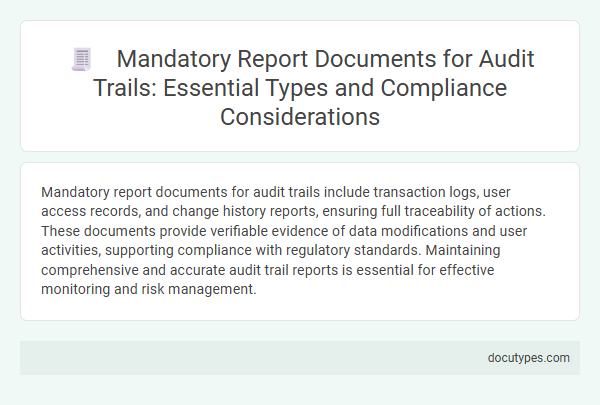Mandatory report documents for audit trails include transaction logs, user access records, and change history reports, ensuring full traceability of actions. These documents provide verifiable evidence of data modifications and user activities, supporting compliance with regulatory standards. Maintaining comprehensive and accurate audit trail reports is essential for effective monitoring and risk management.
Introduction to Mandatory Report Documents for Audit Trails
Audit trails are essential for maintaining transparency and accountability in financial and operational processes. Certain report documents are mandatory to ensure the integrity and traceability of audit trails.
Mandatory report documents typically include transaction logs, system activity records, and access reports. These documents provide detailed evidence of all actions taken within a system, enabling auditors to verify compliance with regulatory standards. Proper documentation supports risk management efforts and reinforces organizational governance.
Importance of Audit Trails in Regulatory Compliance
| Report Document | Description | Importance in Audit Trails |
|---|---|---|
| Access Logs | Records detailing user access times, IP addresses, and activities within the system. | Crucial for tracking unauthorized access and ensuring accountability during audits. |
| Transaction Records | Comprehensive logs of all financial and operational transactions executed. | Essential for verifying data integrity and tracing discrepancies in financial audits. |
| Change Management Reports | Documentation of modifications in systems, including software updates and configuration changes. | Helps auditors ensure that changes comply with regulatory standards and internal policies. |
| System Event Logs | Detailed records of system events such as errors, warnings, and system failures. | Supports identification of system anomalies and validation of incident responses. |
| User Activity Reports | Summaries of user interactions focusing on high-risk or sensitive operations. | Monitors adherence to regulatory requirements by tracking user behavior. |
| Regulatory Compliance Reports | Specific reports demonstrating adherence to industry regulations and standards. | Provides direct evidence of compliance during audits to meet legal obligations. |
| Backup and Recovery Logs | Records detailing data backup schedules, status, and recovery tests. | Ensures data availability and integrity, supporting disaster recovery compliance. |
Key Types of Mandatory Audit Trail Reports
Which report documents are mandatory for effective audit trails? Mandatory audit trail reports include transaction logs, access records, and change histories. These reports ensure transparency and accountability within an organization's financial and operational processes.
What are the key types of mandatory audit trail reports? The primary categories include event logs that capture user activities, system-generated reports detailing modifications, and compliance reports verifying adherence to regulatory standards. Each type supports thorough examination and verification during audits.
Why is the transaction log crucial among audit trail reports? Transaction logs provide a detailed record of all financial activities and system transactions. This data is essential for tracing errors, detecting fraud, and validating the integrity of accounting records.
How do access records contribute to audit trails? Access records document who accessed specific systems and data, along with timestamps and access duration. This information highlights unauthorized access attempts and ensures accountability.
What role do change histories play in audit trails? Change histories track modifications to data, system configurations, or documents over time. This enables auditors to understand the sequence of changes and identify any unauthorized or unexpected alterations.
Financial Transaction Reports and Documentation
Financial transaction reports are essential documents required for creating accurate audit trails, enabling traceability of all monetary exchanges within an organization. Documentation must include detailed ledgers, invoices, and payment confirmations to provide comprehensive evidence for each transaction. You must ensure these reports are maintained systematically to comply with regulatory standards and facilitate efficient audits.
User Access and Activity Log Reports
Audit trails require specific report documents to ensure accountability and transparency. Mandatory reports include User Access Reports, detailing who accessed the system and when, and Activity Log Reports, capturing all actions performed by users. You must maintain these records to comply with regulatory standards and support security investigations.
Change Management and Version Control Reports
Audit trails require specific report documents to ensure transparency and accountability. Change Management and Version Control Reports play a critical role in this process.
- Change Management Report - Documents all modifications, approvals, and implementation timelines within a system.
- Version Control Report - Tracks different versions of files or software components, showing detailed revision histories.
- Mandatory Documentation - Ensures compliance with regulatory standards and provides a clear record for audits.
Incident and Exception Reports
Audit trails require specific report documents to ensure accountability and traceability of actions. Incident and exception reports are critical for documenting deviations and unusual activities within systems or processes.
- Incident Reports - These documents record detailed information about unexpected events or system failures that impact operations.
- Exception Reports - These reports capture deviations from standard procedures or thresholds, highlighting non-compliance or anomalies.
- Mandatory Documentation - Both incident and exception reports are essential to maintain comprehensive audit trails for regulatory and internal control purposes.
Data Retention and Archiving Requirements
Mandatory report documents for audit trails primarily include transaction logs, access records, and change histories to ensure comprehensive data tracking. These documents are essential for verifying data integrity and compliance with regulatory standards.
Data retention policies require organizations to store these reports for a specified period, often dictated by industry regulations such as GDPR, HIPAA, or SOX. Proper archiving practices must guarantee the security, accessibility, and immutability of audit trail documents throughout the retention period.
Compliance Considerations and Best Practices
Mandatory report documents for audit trails include transaction logs, user access records, and change management reports. These documents ensure full traceability of actions and support regulatory compliance requirements.
Compliance considerations require maintaining an unalterable log of all critical system activities to meet standards such as SOX, HIPAA, and GDPR. Best practices emphasize regular review, secure storage, and timely generation of these reports to support audits effectively.
Which Report Documents Are Mandatory for Audit Trails? Infographic

